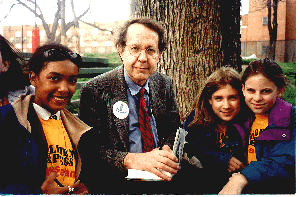
CE NEWS STORIES
Author discusses racism and neglect of city children
By Children's Express New York Bureau
Children's Express News Team:
Jessie Delicema, 15; Frances Barrios, 16; Emily Chuk, 11;
Ilana Novick, 12; Jasmine Victoria, 14; Jessica Jacobson, 12
The South Bronx is a major waste distribution area. Children there are inhaling bad stuff, like medical and toxic waste, and kids get asthma from the garbage dump placed there.
Children's Express interviewed Jonathan Kozol, educator and author of a book called Amazing Grace, in the garden at St. Ann's Church in the South Bronx. Amazing Grace is about kids in the Bronx, how their voices are never heard because people think they're unimportant.
"New York City, which is one of the most racist cities in the world, has dumped all its toxic industries in the neighborhoods where poor black and Latino children live," Kozol explained. "The rich and powerful white folks in New York City need a place to put a big sewage plant.
"So the young people who grow up here, who already were the sickest children in New York City because of poor nutrition, difficulty sleeping, crowded apartments and noisy streets, also are exposed to the most toxic air in the city of New York."
Kozol also said that there is a very big chance of one's house catching on fire in the South Bronx.
"While I was writing my book, two kids within four blocks of here died in fires," he said. "Not because their mother or father had done anything wrong, but because the city does not do fire inspections and enforce fire laws, safety laws, in neighborhoods where poor children of color live."
Kozol taught children during the civil rights movement and he has written about nine books. He got the title of Amazing Grace from the song. He felt that the song best suited how he felt about the children.
"The grace in this book is the grace that you'll find in the hearts of the good people here," he explained. "The heroes of this book are the children and the grownups who live in this neighborhood and retain their basic decency despite all the evil things that our society has done to them."

CE kids interview Jonathan Kozol
Kozol focuses on racism and segregation. He said that these people are being segregated from the rest of the country, from the rest of New York, just because they are black and Hispanic.
"We live in an age when there are racial barriers everywhere," Kozol said. "Most black kids in America grow up and don't know any white people, and most white kids grow up and don't know any blacks or Latinos."
Kozol talked about some of the observations that he made and some of the feelings he felt while writing the book.
"I met so many beautiful children here, who are good and generous in spirit," he said. "I wanted to find a way to pay tribute to the beautiful qualities of the children and the families I met here."
Kozol described the neighborhood and some of the people who were being nice to him. "Most of the people in this neighborhood who are the poorest people I've ever known financially, are the richest in spirit," he said. "The poorest families here almost always ask me if I'm hungry and invite me to supper and share what little they have with me."
Kozol also mentions in his book that children in the south Bronx are really religious. "The children raise questions of good and evil more often than most children I've met in the United States," he said. "I think that when people know hunger and homelessness and sadness and depression, they're more open to religious thoughts."
Kozol grew up in a rich neighborhood near Boston and his opinion about religion changed as a result of these children's beliefs. "I hadn't thought about religion since I was 13 years old," he said. "But the children in this neighborhood brought my thoughts back to religion for the first time.
"These little children make religion real," he went on. "Somebody once said if you want to find God, look in the face of a child. I'm always looking for God at St. Ann's church."
One of the reasons Kozol wrote the book was so that these children could be acknowledged. The children's voices weren't being heard and he wanted people to hear them.
"I didn't write this book to fight a battle," Kozol said. "I wrote the book simply to say: here are some wonderful people, here are some beautiful children, here are some courageous grownups whose voices are never heard; listen to their voices.
"If you asked what battle would I like to fight someday, I would like to see a rebirth of the kinds of struggles we had 30 years ago," he continued. "I would like to see another time when poor people would rise up in honest anger and fill the streets in the richest neighborhoods of New York City.
"I pray that when that happens, thousands of decent young white people will join them and support them. But I don't know if that's going to happen while I'm still alive. I'm not optimistic right now. "
All Rights Reserved




